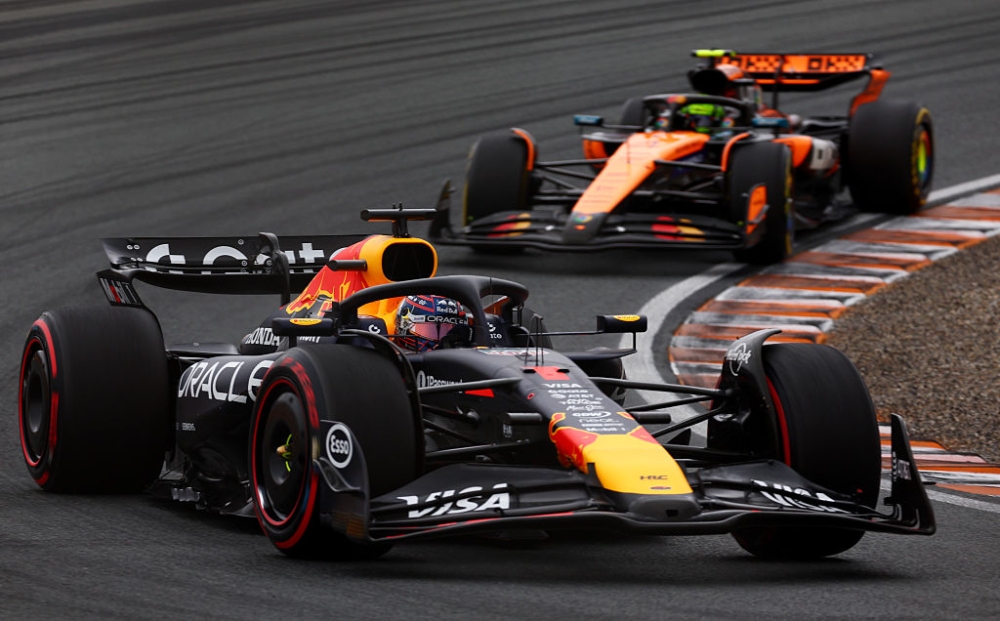Max Verstappen Reflects on His Performance at the Dutch Grand Prix
In the highly competitive atmosphere of Formula 1, every race brings unique challenges and opportunities for drivers. Max Verstappen, a prominent figure in the world of motorsport, recently shared his thoughts on his performance during the Dutch Grand Prix, where he found himself facing off against the McLaren drivers. His reflections shed light on the complexities of racing dynamics and the strategies employed by top-tier drivers.
The Competitive Landscape of the Dutch Grand Prix
The Dutch Grand Prix, held at the Zandvoort circuit, is renowned for its challenging layout and enthusiastic crowd. Verstappen, who has established himself as one of the leading drivers in Formula 1, recognized the significance of the race and the competitive landscape he was a part of. Despite his skills and experience, he remarked on feeling a disconnect with the McLaren drivers, particularly in terms of race pace and overall performance.
Verstappen noted that he was racing "in a different league" compared to his competitors, specifically referencing the two McLaren contenders, Oscar Piastri and Lando Norris. This statement highlights the intricate nature of competition in Formula 1, where even the slightest differences in car performance and driver capability can significantly affect race outcomes.
The Race Dynamics: Analyzing the Start
As the race commenced, Piastri showcased impressive skill by maintaining the lead at the start. Verstappen, on the other hand, managed to overtake Norris early on, which initially positioned him well in the race. However, the dynamics quickly shifted. Verstappen soon found himself unable to mount a sustained challenge against Piastri and was overtaken by Norris again.
The complexities of race strategy came to the forefront as multiple Safety Car periods altered the race’s rhythm. These interruptions can often provide opportunities for drivers to regroup and strategize, but they can also complicate matters, especially when tire strategies are involved.
Tire Management and Race Strategy
One of the key elements that Verstappen pointed out was the issue of tire behavior throughout the race. He explained that while he was able to manage his pace, it became evident that his car’s performance was not where it needed to be, especially compared to the McLarens. The tire management aspect is crucial in Formula 1, as it directly affects a driver’s ability to maintain speed and make strategic overtakes.
Verstappen’s comments indicate a significant understanding of the importance of tire dynamics in racing. He mentioned, "It always seems like in the race we just struggle more than over one lap with the tire behavior." This reflects the broader challenges that drivers face during a race, where managing tire performance can be just as critical as the raw speed of the car.
The Importance of Risk Management
Throughout the race, Verstappen emphasized the need for caution and strategic thinking. He recognized that engaging in fierce battles with the McLaren drivers could jeopardize his own race. "There’s no point trying to ruin your own race defending really hard," he stated. This sentiment underscores a critical aspect of racing: the balance between aggression and prudence.
In high-stakes environments like Formula 1, drivers must often weigh the risks of engaging in battles that could lead to potential collisions or performance losses. Verstappen’s decision to prioritize his race over risky maneuvers is indicative of a mature racing mindset, one that understands the long game of the championship rather than succumbing to immediate pressures.
Reflections on Championship Dynamics
As the race progressed, Verstappen’s thoughts turned to the broader implications of the championship standings. With Norris eventually retiring due to mechanical issues, Piastri was able to extend his championship lead significantly. Verstappen’s experience in the championship arena allowed him to reflect on the unpredictable nature of racing. He acknowledged, "It’s out of your control. So, you just need to keep working hard, keep trying to win."
This perspective highlights a vital lesson in motorsport: the importance of resilience and adaptability. Verstappen’s acknowledgment that circumstances can change rapidly in racing serves as a reminder of the inherent unpredictability of the sport. Mechanical failures, strategic miscalculations, and the performance of rival teams can all play pivotal roles in shaping the championship landscape.
The Broader Implications for Team Dynamics
Verstappen’s experience also sheds light on the intricate relationships between teammates in Formula 1. He pointed out that when driving for the same team, both drivers share similar cars and opportunities, which can complicate the competitive dynamic. The pressure to outperform a teammate can lead to intense battles on the track, but it can also foster collaboration and mutual growth.
"The situation can change again quickly," Verstappen remarked, emphasizing the importance of maintaining focus and determination despite the ups and downs of the season. This insight underscores the reality that success in Formula 1 is often a collaborative effort, reliant not only on individual skill but also on the synergy within the team.
The Road Ahead: Continuing the Fight
As the season progresses, Verstappen remains committed to improving his performance and contributing to his team’s success. He understands that numerous races lie ahead, providing ample opportunities to turn the tide in the championship. "There are enough races to either turn it around or not, and time will tell," he stated, reflecting a sense of optimism and determination.
This forward-looking mindset is crucial for any driver aspiring to win championships. The ability to remain focused and motivated, even in the face of challenges, is a testament to Verstappen’s character as a driver and competitor.
Conclusion: The Essence of Competitive Racing
In the world of Formula 1, every race is a story of strategy, skill, and resilience. Max Verstappen’s reflections on his performance at the Dutch Grand Prix highlight the multifaceted nature of racing, where tire management, risk assessment, and team dynamics all play critical roles in determining success. As the season unfolds, Verstappen’s commitment to improvement and his understanding of the ever-changing landscape of competition will undoubtedly keep fans and analysts alike eager to see how the championship battle develops.
